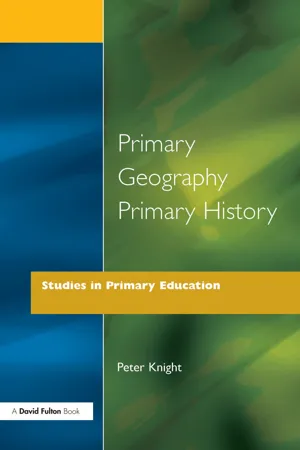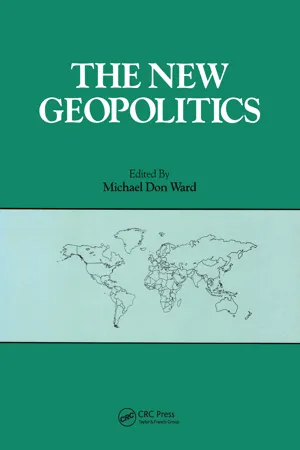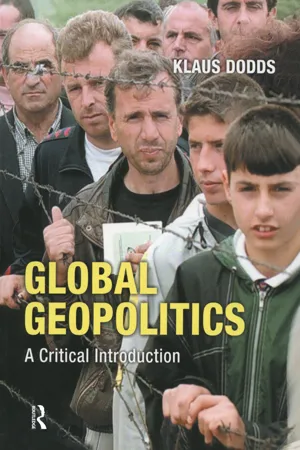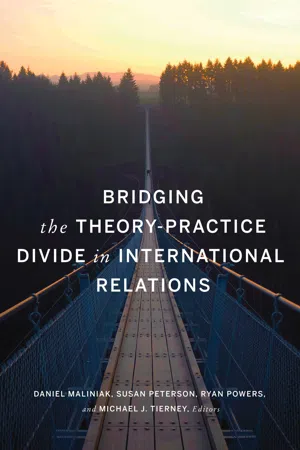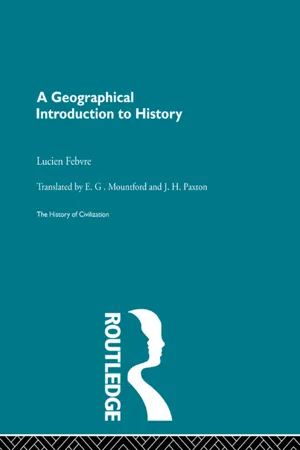Global Influence
Global influence refers to the impact and power that a country, organization, or culture has on a worldwide scale. It encompasses economic, political, social, and cultural influence that extends beyond national borders. In geography, global influence is often studied in terms of how different regions and countries shape and are shaped by global interconnectedness and interdependence.
8 Key excerpts on "Global Influence"
- eBook - ePub
- Geoffrey Sloan(Author)
- 2017(Publication Date)
- Routledge(Publisher)
...Geopolitics highlights the point that securing political predominance is not merely a question of having power in the sense of the availability of natural resources, the acquisition of wealth or a capacity for projecting force, but it is also dependent on the configuration of the field within which that power is exercised. Over time, that field within which power is exercised may expand (or contract) given the changing nature of alliances, the emergence of new adversaries and enemies, shifts in where technological advances occur, mistaken policy decisions and a number of other salient factors. Obviously, one goal of policy makers is to extend the geographic configuration over which power is exercised. Geopolitical practice and the conceptualizations that it produces over time remain pertinent to the practice of international relations because ‘Geopolitical thinking is inherent to the very practice of foreign policy, though this is not always made explicit’. 39 Furthermore, it is from choices made by policy makers that political importance or relevance is attached to geographical configurations or locations. The geographical factors which influence politics are a product of policy makers selecting particular objectives and attempting to realize them by the conscious formulation strategies vis-à-vis potential or realized adversaries. In short a geographical perspective is inevitable if an international policy is to be formulated and successfully implemented in the teeth of inevitable opposition: In nearly all international transactions involving some element of opposition, resistance, struggle or conflict, the factors of location, space and distance between the interacting parties have been significant variables. This significance is embodied in the maxim, ‘power is local’...
- eBook - ePub
Geofusion 2.0
The Power of Geography in the Economic and Geopolitical World Order
- Norbert Csizmadia, Bence Gáspár(Authors)
- 2021(Publication Date)
- PublishDrive(Publisher)
...CHAPTER 2 The Relationship Between Geography and Geopolitics The Interdisciplinary Relationship Between Geography and Geopolitics The place of geography in the system of sciences Geography once referred solely to the description of Earth; however, by the 20th century, it grew out of the descriptive role and integrated a spatial approach at its frontiers, creating its own subdomains. Nowadays a wide range of sciences, especially social sciences, increasingly turn to geography out of necessity nowadays. New ideas are produced with remarkable intensity in the interdisciplinary fields of economics and geography. The central role played by these geographical features in the development of countries and the global economy is increasingly seen as important in mainstream economic thinking. For example, the rise of geoeconomics, which develops at the intersection of geography, geopolitics, and economics, is due to the realization that development is best explained on a global scale by geographical and historical correlations. The main aim of the book Geography: A Global Synthesis by Peter Haggett, a professor emeritus at the University of Bristol, is to present the whole spectrum of geography in a modern approach. According to him, geography has become a synthetizing science that deals with the spatial context, correlation, distribution, and interrelationships of the social, economic, and environmental processes and phenomena that occur on Earth. Geographical synthesis concerns all branches of geography as well as the neighboring disciplines. Among geographical disciplines, a new fault line was opened with the appearance of regional science in the 20th century. Haggett breaks down the study of geography into five topics...
- eBook - ePub
- Peter Knight(Author)
- 2013(Publication Date)
- Routledge(Publisher)
...The locality should also be seen in the context of the home region, thereby introducing the concept of ‘regions’. Similarities and differences with other areas studied should be brought out and the issue of change should also be woven through the work. The interaction of weather, landscape and wealth on people’s lives is to be studied in the developing country. The physical geography involves them learning about a number of features (beach, river, valley), erosion and deposition processes, water courses, weather conditions in different parts of the world, vulcanology, seismology, and the nature of different soils. Settlements and their functions are associated with ideas explaining different population densities and migration and transport patterns, with the most advanced children being encouraged to consider the factors which make for change in human geography, alongside elementary locational theory. They are not so explicitly invited to consider the values issues in the environment, although there is considerable emphasis on ways of improving the locality. Global environmental issues get scant attention. Criticisms of this curriculum remind us that it is simply one view of geography (e.g. Catling, 1990b; Graves et al, 1990). A vocal criticism has been that geography can be seen very much as the study of human behaviour, and so it is necessarily, primarily concerned with human values, firstly, in order to make sense of and to understand human action, and secondly, in order to help students reflect upon their own values and the sort of world which they wish to live in (Fisher and Hicks, 1985; Pike and Selby, 1988; Hicks and Steiner, 1989). This curriculum is thought to have pushed values issues to the margins...
- eBook - ePub
- Michael Don Ward(Author)
- 2022(Publication Date)
- Routledge(Publisher)
...Geopolitical factors comprise an absolutely essential dimension of the environment that surrounds the whole range of entities that act in world politics—from individuals to states (and other, non-state, actors). The geopolitical environment, according to Osterud (1988) includes the effects of space, topography, position and climate. Harold Sprout (1963) has asserted that geopolitical hypotheses deal with the configuration and layout of lands and seas, climate, and the distribution of natural resources, as well as those dealing with the distribution of people, social institutions, or behavioral patterns. Thus, all international actors, or entities, may be located spatially—in the some geopolitical arrangement of typography; some distribution of people, behavior and resources. CONTEXT: THE STRUCTURE OF OPPORTUNITIES AND WILLINGNESS Geopolitical factors in the environment thus provide a structure of opportunities and constraints. The geopolitical structure, including the geographic structure is “always both enabling and constraining,” as Giddens (1984: 169) has observed about structure in general. Structure is thus more than simply opportunity, or possibilism. It is central in presenting a structure of risks and opportunities to decision makers. As developed in Most and Starr (1989: 30-33) opportunity consists both of the possibilities that exist in the international system at any point in history (e.g., technology, ideology, religion, social inventions such as new forms of government), and how those possibilities are distributed in the system. This latter dimension is analogous to Harold Sprouts’ concern for the distribution of resources, people or behavior. It also derives from the Sprouts’ discussion of “capability analysis” (e.g., 1969: 53). The possibilities or opportunities that exist, and their distribution, help us understand how costly or risky certain options appear to decision makers, and how they might calculate the expected utility of those actions...
- eBook - ePub
Global Geopolitics
A Critical Introduction
- Klaus J. Dodds(Author)
- 2014(Publication Date)
- Routledge(Publisher)
...Some commentators argue that the phenomenon of globalization is exaggerated, not least because supporters tend to over-emphasize the demise of the nation-state and territorial boundaries (e.g. Hirst and Thompson 1996). From a ‘Southern’ perspective, globalization often appears to refer to processes and flows that benefit highly industrial Northern democracies at the expense of regions such as Central America and Sub-Saharan Africa (see Chapter 3). For many people simply struggling to survive on a daily basis (often with limited mobility), the world of the Internet, the mobile phone and the ‘global advertising’ must seem incongruous. This has prompted a current of critical opinion which has argued that deepening inequalities need to be given due consideration in any study of globalization and its impact on politics, cultures and economies. It is therefore expedient to review the most significant approaches to geopolitics alongside those concerned with world politics. At the same time we shall consider how globalization might influence those theories and their findings. The field of critical geopolitics is considered first, followed by a section on the body of political thought called political realism, which is highly popular within academic and policy-making circles especially within the United States. It is an approach to world politics that bears similarities with traditional geopolitical approaches considered in Chapter 1. Liberal approaches are explored next, because they seek to combine liberal and elements of realist ideas on world politics. Finally, we turn to some of the recent critical geopolitical attempts to reconceptualise geopolitics, global politics and globalization. While this chapter does not consider in detail bodies of thought such as world-systems theories and feminist approaches to politics, it nevertheless aims to demonstrate that a variety of approaches can be brought to bear on world politics...
- eBook - ePub
Regional Geography
Theory and Practice
- Roger Minshull(Author)
- 2017(Publication Date)
- Routledge(Publisher)
...In addition to the fact that modern regional geography degenerates into a systematic account, much ostensibly systematic geography has a strong regional component. Works of physical geography are less liable to this, concentrating on general principles of geology, geomorphology or soil development and simply selecting regional examples. Climatology tends to be more exhaustive and follow general considerations of elements and factors of climate with a complete description of world climates, but then the possibility and desirability of defining climatic regions is greater than that of defining regions in the other phenomena. But some works which at first glance appear to be systematic, economic, political, social or human geographies turn out in fact to be merely world geographies with the emphasis on economics, all Man’s activities, or on political units. These are just larger, more generalised accounts of the world than the continental geographies, again on a regional basis. For example, political geography takes the nation state as the essential unit, the region, uses the national boundaries as the perfect definition of the region, and puts more emphasis on the facts of shape, size and position of the region than does ordinary regional geography. 6 However, the main reason for the merging of potentially systematic human geography into world regional geography is its inability to form general laws and principles. As Hartshorne, and Wooldridge and East have pointed out, the very subject matter of human geography, with its diversity and unpredictable human behaviour which contrast with the uniformity and probability of natural phenomena, prevents any valid generalisations which will apply at any time in any place...
- Daniel Maliniak, Susan Peterson, Ryan Powers, Michael J. Tierney, Daniel Maliniak, Susan Peterson, Ryan Powers, Michael J. Tierney(Authors)
- 2020(Publication Date)
- Georgetown University Press(Publisher)
...4 THE STUDY AND PRACTICE OF GLOBAL ENVIRONMENTAL POLITICS Policy Influence through Participation Jessica F. Green and Thomas Hale Unlike war or trade, transboundary environmental problems are a relatively new feature of world politics. Despite their relative newness, environmental challenges will occupy a central and growing place in practitioners’ attention for the foreseeable future. Our impact on the natural world is destabilizing human societies. The implications for world politics are profound. As an October 2014 Pentagon report noted, “Rising global temperatures, changing precipitation patterns, climbing sea levels, and more extreme weather events will intensify the challenges of global instability, hunger, poverty, and conflict. They will likely lead to food and water shortages, pandemic disease, disputes over refugees and resources, and destruction by natural disasters in regions across the globe” (US Department of Defense 2014).” International relations (IR) scholars agree. According to the TRIP data, IR scholars already see environmental issues like global climate change as the most important policy challenges of the century (Green and Hale 2017). The implications for the study of world politics are similarly weighty. If IR cannot contribute to environmental questions that concern the survival of humanity, it will be of limited relevance to world politics. But while the study of global environmental issues has expanded in IR, global environmental politics (GEP) remains one of the more neglected subject areas in the field (Javeline 2014; Keohane 2014; Green and Hale 2017). Using the 2014 Teaching, Research, and International Policy (TRIP) faculty survey data, we classified GEP scholars as any respondent who listed “international environment” or “environment” as either a primary or secondary research area (Maliniak et al...
- eBook - ePub
- L. Febvre(Author)
- 2013(Publication Date)
- Routledge(Publisher)
...Let them by all means make the “powers of the soil” and the “forces of the climate” act on the “genius of peoples” and the “history of nations” as their fancy dictates. But they may adventure alone. Their work seems to us sterile—if not dangerous. They have taken the problem of environment ready set from an old-time tradition. They have not tried to rejuvenate its setting. They stick to that geographical influence, at once powerful and obscure, multiform and complex, which is exerted, they tell us, both on man physical and moral and on man social and political—on the colour of his skin, the shape of his body, the strength of his organism, his psychic qualities and defects, his judicial, economic and religious institutions—even the productions of his mind, the creations of art and genius. They state it as a fact. But they do not prove it. Are we then to say that geography, which is commonly supposed to explain so many things, explains nothing? We must not jump at such a conclusion. How is geography concerned in the matter up to the present? II Human Geography and its Critics Geography must be sought where there is no doubt about finding it—among the geographers. Anyone nowadays who wants instruction on the relations between the land and history —I mean conscientiously and with guarantees—must apply to them first. He should and he can. The old geographer, whose only care was to describe, enumerate, and make inventories, is no more. For physical geography, based on the physical and natural sciences—geology, climatology, botany, zoology—has disentangled itself from them little by little, made sure of its methods, defined its own object clearly, and become conscious of its individuality...


